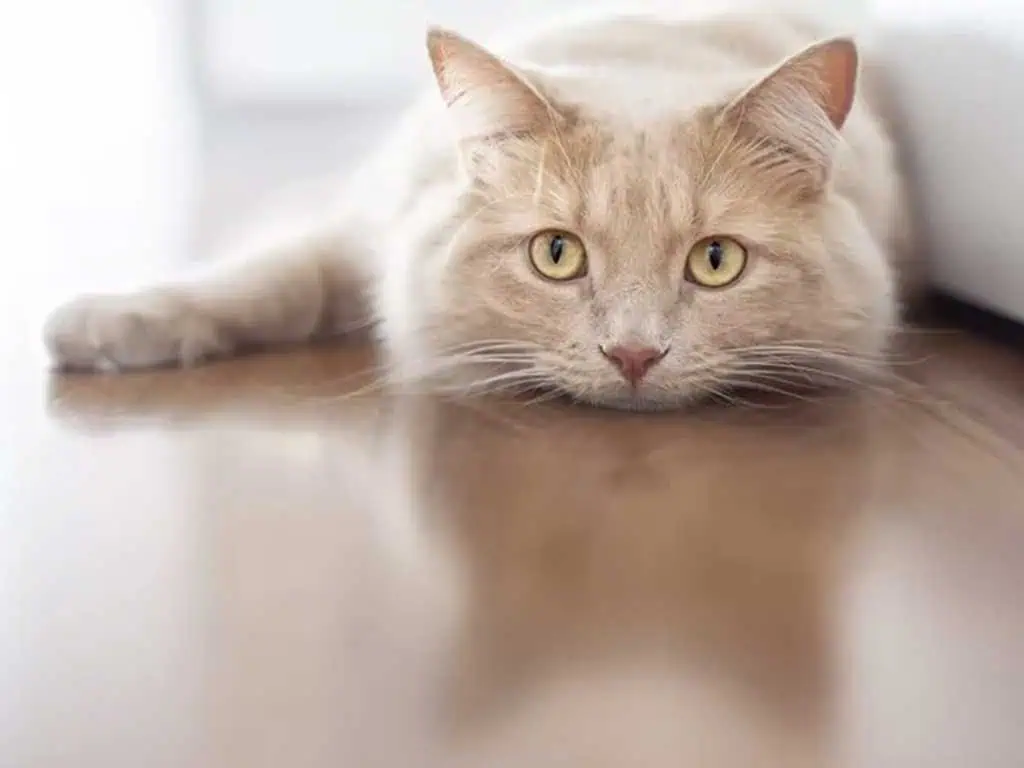
Cats vomit for many reasons, but when you notice your cat throwing up undigested food, it’s natural to worry. Why is my cat vomiting undigested food? This is a common question among pet parents, and the answer can range from harmless causes like eating too fast to serious health problems that require a vet’s attention.
Let’s explore the most common causes, what you should do about them, and when it’s time to seek professional help.
Table of Contents
Common Causes of Vomiting Undigested Food in Cats
Eating Too Fast
Some cats eat quickly, which can cause food to back up and trigger regurgitation. This often happens with dry kibble that swells in the stomach. Using a slow feeder, just like the HAPAW Smart Cat Water Fountain helps regulate water intake, can slow eating and reduce vomiting.
Hairballs and Grooming Habits
Excessive grooming can cause hair to build up in the stomach, making digestion harder. When mixed with food, hair can cause vomiting of partially digested meals. Regular brushing helps reduce this risk.
Dietary Changes
Switching food brands or introducing new ingredients can upset a cat’s stomach. Sudden changes often cause regurgitation until the digestive system adjusts.
Food Intolerances or Allergies
Cats may be intolerant to certain proteins or grains. These sensitivities can trigger vomiting when undigested food irritates the stomach lining.
Gastrointestinal Blockages
Foreign objects like string, small toys, or bones can obstruct digestion. This can lead to vomiting of food that hasn’t had time to break down. A vet visit is crucial if you suspect this cause.
Underlying Health Conditions
Issues like gastritis, pancreatitis, or kidney disease may cause regurgitation of undigested food. These conditions require diagnosis and treatment by a veterinarian.
Parasites
Intestinal parasites can interfere with digestion and cause repeated vomiting. Routine deworming and regular vet checkups help prevent this.
When to See a Veterinarian
If vomiting is frequent, forceful, or accompanied by other symptoms like lethargy, diarrhea, or weight loss, seek veterinary care immediately. Chronic vomiting may indicate a serious medical issue that requires professional treatment.
How Vets Typically Diagnose the Issue
- Physical exam – checking hydration, abdominal sensitivity, and overall health.
- Blood work – to rule out organ disease or infection.
- X-rays or ultrasounds – to detect blockages or abnormal growths.
- Fecal exam – to check for parasites.
These steps help pinpoint whether the vomiting is behavioral, dietary, or medical in origin.
Safe Home Remedies to Try
- Switch to smaller, frequent meals – reduces stomach overload.
- Try a slow feeder bowl – prevents gulping food too quickly.
- Hydration matters – always provide clean, fresh water.
- Hairball remedies – regular grooming and hairball control treats help.
Comparison Table: Causes of Vomiting vs. What to Do
| Cause | What It Looks Like | What You Can Do |
|---|---|---|
| Eating too fast | Regurgitation soon after meals | Use slow feeder bowl |
| Hairballs | Vomit mixed with fur | Regular brushing, hairball treats |
| Dietary change | Vomiting after new food | Transition slowly over 7–10 days |
| Food intolerance/allergy | Repeated vomiting with certain foods | Try limited-ingredient diet |
| GI blockage | Frequent vomiting, lethargy | Emergency vet visit |
| Parasites | Vomiting + diarrhea | Deworming medication (vet prescribed) |
| Chronic illness | Persistent symptoms | Full vet examination and treatment |
FAQ Why Is My Cat Vomiting Undigested Food
Why is my cat vomiting undigested food hours after eating?
This often suggests delayed gastric emptying, food intolerance, or a potential blockage. A vet should evaluate if it happens regularly.
Can stress cause my cat to vomit food?
Yes, stress or anxiety can affect digestion, sometimes leading to vomiting. Calming environments and interactive toys help reduce stress.
Should I change my cat’s food if vomiting happens often?
Yes, but do it gradually. A slow transition over a week helps prevent stomach upset. Always consult a vet before major dietary changes.
How do I know if it’s an emergency?
If your cat vomits repeatedly in a day, seems weak, or vomits with blood, seek immediate veterinary attention
Final Thoughts
If you’ve been asking yourself, “Why is my cat vomiting undigested food?” remember that occasional regurgitation is common, but frequent or severe vomiting is a red flag. By monitoring eating habits, grooming, and diet, you can reduce mild cases. However, always consult a vet if you notice persistent issues.
Taking proactive steps today helps protect your cat’s long-term health and ensures they stay happy, comfortable, and safe.

